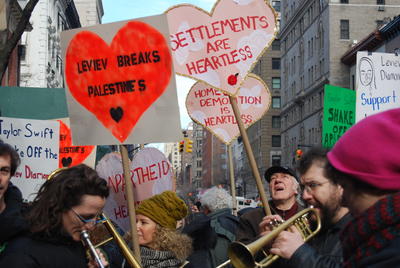A week before Valentine’s Day, as couples in many countries prepare to celebrate their love for one another, at our protest at Leviev diamonds in New York City we remembered that Palestinians do not have the freedom to love whomever they choose due to Israel’s apartheid policies. We celebrated through the stories below the many Palestinians who dare to defy apartheid with love. Leviev, by building Israel settlements, contributes to Israel’s apartheid program. For more information see http://www.loveunderapartheid.com/
 Palestinians -- whether living in Israel as Israeli citizens or in Jerusalem, the West Bank or Gaza, live under Israeli rule. Israel assigns separate ID cards to the Palestinians living in each area, and each ID card carries a different status and different rights. While this impacts Palestinians in many ways, one of the most intrusive and harmful results is the separation of loved ones.
Palestinians -- whether living in Israel as Israeli citizens or in Jerusalem, the West Bank or Gaza, live under Israeli rule. Israel assigns separate ID cards to the Palestinians living in each area, and each ID card carries a different status and different rights. While this impacts Palestinians in many ways, one of the most intrusive and harmful results is the separation of loved ones.
Palestinians do not have the freedom to love whomever they choose because multiple Israeli policies prevent them from doing so. For instance, if someone from the West Bank fell in love with someone from Gaza, they could not be together, because one carries an Israeli government-issued "West Bank only" ID and the other a "Gaza only" ID. This is despite the fact that both the West Bank and Gaza Strip are designated as Palestinian territories.
The Israeli Citizenship Law, which was enacted in 2003, prevents Palestinian citizens of Israel from marrying the spouse of their choice. This law affects thousands of Palestinian citizens of Israel, and many couples have been forced to leave the country as a result, leaving behind their homes and their families.
Here are a couple of stories from the Love Under Apartheid campaign:
Taiseer and Lana, affected by Israeli Citizenship Law
Taiseer is a Palestinian citizen of Israel from the city of Akka and his wife Lana is a Palestinian from the city of Jenin. Taiseer is an anthropologist and Lana is a librarian. Though they were already married, once the Citizenship Law was put in place, Lana was placed in a new legal category. She lives constantly in fear that she could be separated from her husband and their three young children.
Taiseer says: "We have the right to love and live just like any other people in the world. We are not any less than any people who choose whom, how or where they love."
Lina, affected by Military Order 1650
Lina's parents met while they were college students in the West Bank in the 1980's. They fell in love, got married and had children. Lina's mother has a West Bank ID and her father is a British citizen and originally from Gaza. In the 1980's, Palestinians were more free to live and travel between the Palestinian territories, but in 2009, Israeli Military Order 1650 changed everything. One day while traveling for his work as a journalist, Lina's father was stopped at checkpoint, arrested by soldiers and deported to Gaza, without a chance to say goodbye to his family.
Lina says: "One day we found our family split right in the middle...for my parents not to see each other...it was really emotional watching the effects on them...My dad would send me text messages at the most random hours of the day. I knew he was unable to sleep, thinking 'I had my family with me, I had a job, I had a house, and overnight that completely changed.'"
These stories offer just a glimpse into life under Israeli policies. Palestinians are forced to adjust their lives every time a new policy is in place, every time a border shifts around them. These couples and families don't break the law, the law breaks them. Still, despite these obstacles, Palestinians choose to love, and choose to fight for their rights every day.
